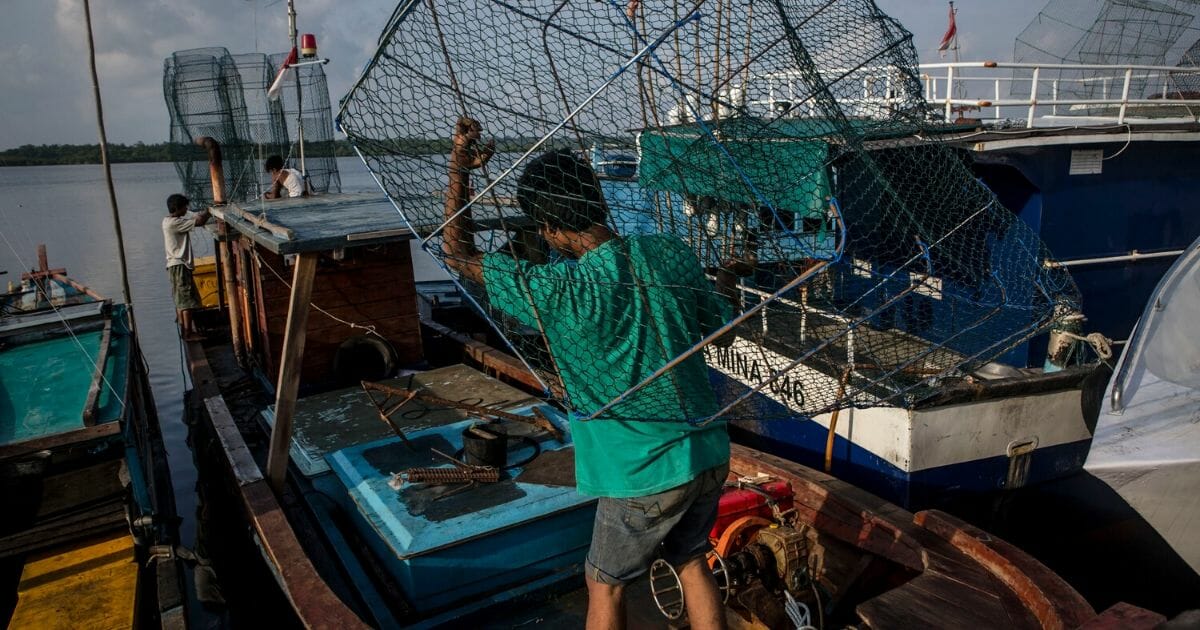
As World's Distracted with Wuhan Virus, China Invades Foreign Territory
Territorial fishing wars aren’t an unusual thing, even in a modern world where ships have GPS and governments can keep a closer eye on things. What gets unusual is when a nation’s coast guard gets involved.
That’s exactly what’s been happening in the South China Sea, where Chinese fishing ships — backed by ships from China’s coast guard — have been invading Indonesian waters, trawling the fishing waters around the Natuna Islands with industrial boats on several occasions.
According to the South China Morning Post, the latest round in the dispute started in January, even as the coronavirus was raging in China.
“Even between friends, between good neighbors, there might be different views, there might be disputes, but it does not matter. … We can talk about many things in a friendly manner,” Chinese ambassador Xiao Qian said at the time.
Apparently, talking about things in a friendly manner when there’s a severe power asymmetry involved doesn’t yield positive results, since China again sent fishing ships to the Natuna Islands in February.
According to a New York Times piece last week, the Natuna Islands are part of an expansive swath of water in the South China Sea that Beijing calls its “traditional fishing grounds.”
To make things worse, The Times reported, Indonesia is loath to anger China, its biggest trading partner. Hence, the fisheries ministry in Indonesia hasn’t even acknowledged the incursion.
“There was a vacant period, then China came back,” Ngesti Yuni Suprapti, deputy regent of the Natuna islands, told The Times. “Our fishermen feel scared.”
As well they should, since the Chinese seem very keen on defending those “traditional fishing waters” even as a fulminant pandemic was taking hold.
“Whether the Indonesian side accepts it or not, nothing will change the objective fact that China has rights and interests over the relevant waters,” Chinese Foreign Ministry spokesman Geng Shuang said in January.
An international tribunal would beg to differ, as it found China’s nautical claims wholly baseless back in 2016. International tribunals being what they are, this affected nothing.
“Beijing wants Chinese fishers to operate here,” U.S. Naval War College assistant professor Ryan Martinson told The Times, “because their presence helps to embody China’s maritime claims.”
China also has been emboldened by ministerial shifts in Indonesian President Joko Widodo’s government.
The fisheries minister during his first term, Susi Pudjiastuti, was fond of seizing and blowing up ships that entered Indonesia’s territorial waters illegally.
While she didn’t manage to do that to a Chinese trawler — she was projecting power, not being stupid — Indonesian forces did fire warning shots on Chinese ships.
This was enough to persuade most Chinese fishing boats to stay out of Indonesian waters, as you might imagine.
However, Indonesian politicians found Susi to be too conflict-friendly, so she was replaced with someone who was more amenable to Beijing when Joko was elected to a second term.
If there was a country that was ripe for territorial water incursion by the Chinese, sadly, it’s Indonesia.
There are several authorities responsible for protecting Indonesia’s coastal waters, but analysts reached by The Times said that “decision-making is diffuse.”
“There is a lack of a single coherent lead agency or a single coherent policy for maritime security,” Evan Laksmana, a senior researcher at the Center for Strategic and International Studies in Jakarta, told The Times. “The Chinese can take advantage of that.”
China also doesn’t take shows of power from the Indonesians very seriously.
“Chinese impunity was on full display in January when President Joko Widodo of Indonesia visited the Natunas,” The Times reported.
“‘There is no bargaining when it comes to our sovereignty,’ Mr. Joko said. Earlier, Indonesian fighter jets buzzed the sky, while warships patrolled the seas.
“But the day after Mr. Joko left the Natunas, the Chinese showed up again. Its fishing fleet, backed by the Chinese Coast Guard, took days to leave the area, local officials and fishers said.”
It’s worth pointing out that no matter what you think about China’s handling of the coronavirus pandemic, its government aided and abetted — if not encouraged — ships to violate the territorial waters of another nation while its resources and attention ought to have been on Hubei province.
It’s not news that China continues to chip away at other nations’ territorial claims in the South China Sea, whether it’s through man-made islands or testing the waters — quite literally — on nautical incursions this.
The news is that this happened during the coronavirus crisis — perhaps at the beginning stage, sure, but still at a stage where China’s attention ought to have been focused elsewhere. It’s not something we have the bandwidth to deal with now.
However, Beijing’s South China Sea ambitions desperately need to be checked, whether it’s through diplomacy, naval freedom of navigation movements or other channels.
Our memory cannot be short when it comes to these affronts to sovereignty and international law, not when they happened under the cover of the most deadly pandemic of the last century.
Truth and Accuracy
We are committed to truth and accuracy in all of our journalism. Read our editorial standards.
Advertise with The Western Journal and reach millions of highly engaged readers, while supporting our work. Advertise Today.












